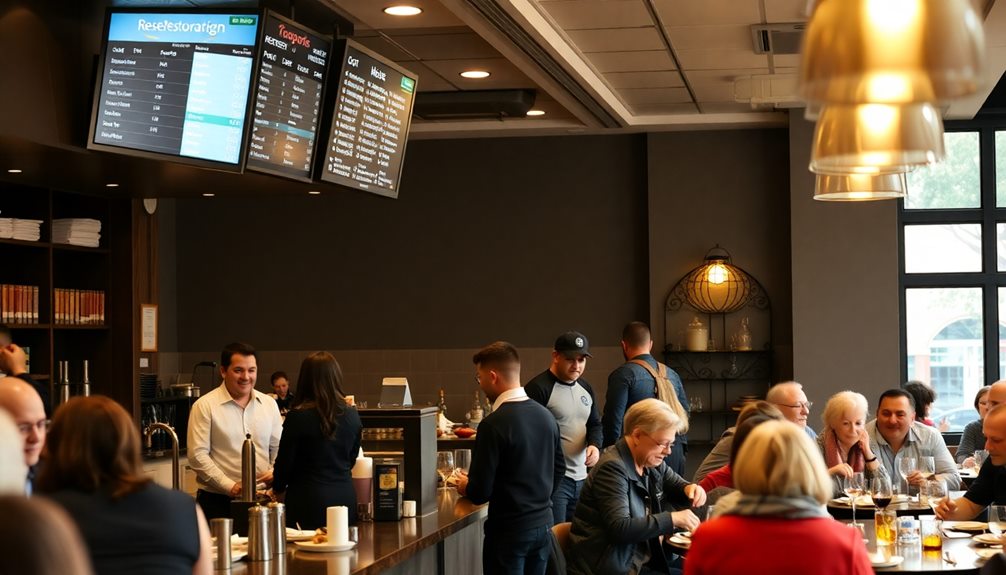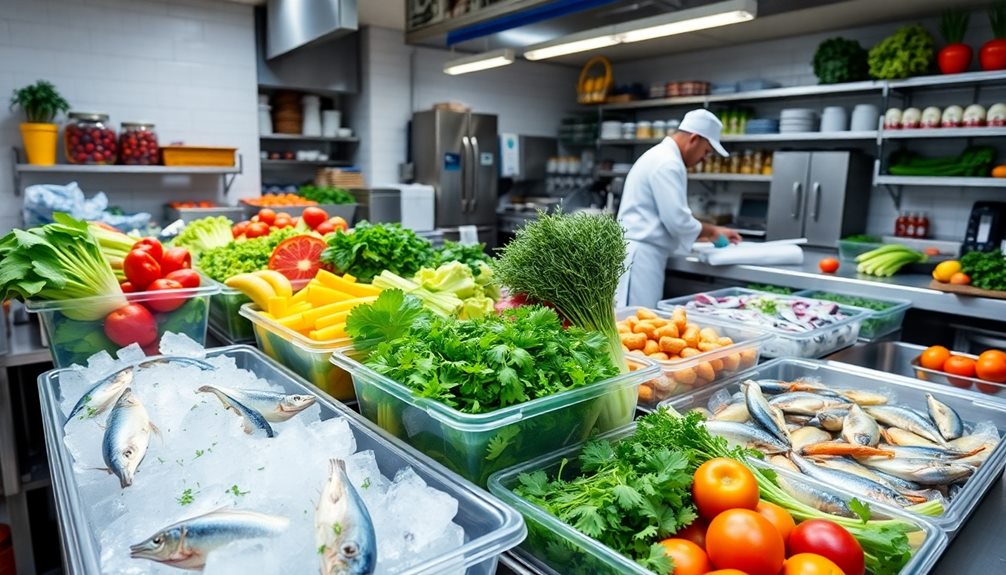Restaurants handle reservations effectively by using technology, establishing clear policies, and training staff. You'll often find platforms like OpenTable and Resy that simplify booking while minimizing wait times. By integrating data analytics, restaurants can anticipate busy times and manage staffing accordingly. Clear communication about reservation policies helps reduce no-show rates, which can average around 15%. Additionally, regular staff training prepares the team for any challenges that arise. This approach not only enhances customer satisfaction but also boosts repeat visits. Keep exploring to uncover more insights on how restaurants continuously improve their reservation processes.
Key Takeaways
- Implement modern online reservation systems to streamline bookings and reduce no-show rates.
- Establish clear cancellation policies to manage expectations and minimize misunderstandings.
- Utilize data analytics to anticipate busy times and optimize staffing and table turnover.
- Train staff thoroughly on reservation protocols to enhance communication and guest satisfaction.
- Regularly review and update reservation policies based on customer feedback for continuous improvement.
Importance of Reservations
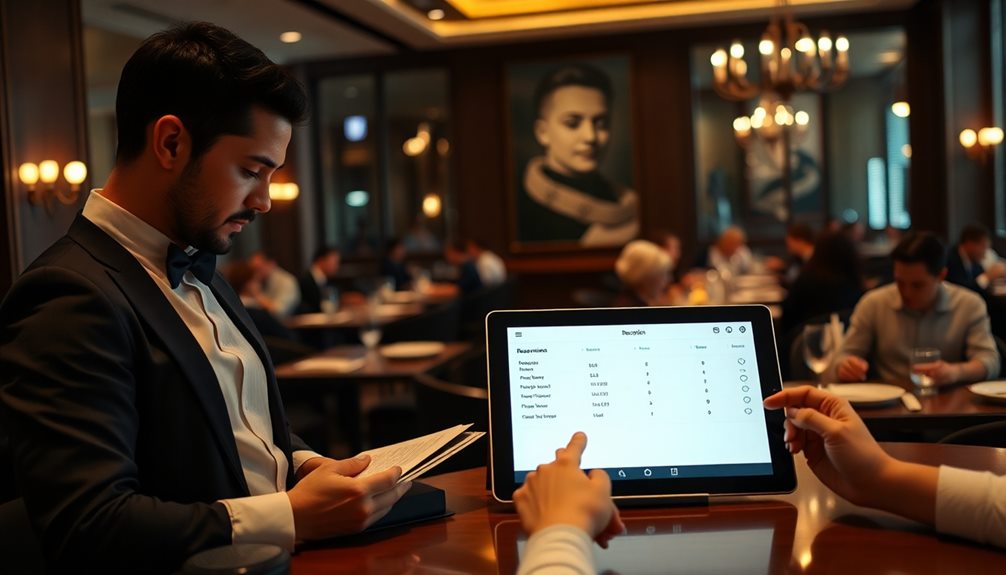
Reservations play an essential role in the dining experience, and many diners appreciate the convenience of pre-booking their tables. When you make a reservation, it not only guarantees your spot but also allows restaurants to manage their seating capacity effectively. This advanced knowledge of guest numbers helps them optimize floor layouts and prepare their service, especially during peak dining hours.
A well-implemented reservation management system can greatly enhance the guest experience by reducing wait times and ensuring timely seating. By sending confirmation emails, restaurants keep you informed and engaged, which builds anticipation for your meal. Additionally, effective table management minimizes no-show rates, allowing restaurants to adjust their plans if necessary and maintain service quality.
For fine-dining establishments, where each guest's experience is paramount, reservations become even more important. They enable staff to deliver attentive service tailored to the anticipated number of diners.
In contrast, casual venues often enjoy more flexibility but still benefit from reservations to help manage their flow. Ultimately, a solid reservation system not only boosts customer satisfaction but also encourages repeat visits, making it an essential tool for any restaurant.
Reservation Channels and Technology
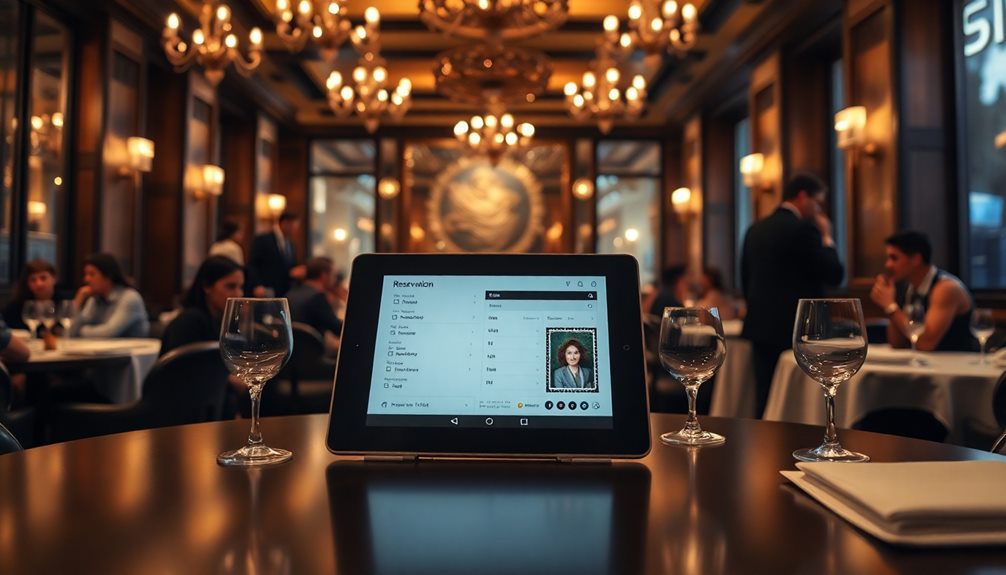
Leveraging various reservation channels and cutting-edge technology is crucial for restaurants aiming to optimize their booking processes. By integrating online reservation systems like OpenTable or Resy, you can enhance guest booking experiences while increasing your restaurant's visibility. Using table management software allows you to effectively coordinate both walk-ins and reservations, improving guest flow during peak times.
Additionally, exploring multiple reservation channels, including social media platforms like Google and Instagram, can greatly expand your booking potential. This approach not only attracts new customers but also helps in managing reservations more efficiently. Implementing SMS-powered waitlists guarantees you handle high-volume walk-ins seamlessly, providing real-time updates to guests and maximizing revenue.
Here's a table summarizing key reservation channels and their benefits:
| Reservation Channel | Benefits | Technology Used |
|---|---|---|
| Direct Website Bookings | Control & low commission costs | Website, Booking System |
| Online Reservation Systems | Enhanced visibility & experience | OpenTable, Resy |
| SMS-Powered Waitlists | Efficient walk-in management | SMS Software |
Challenges in Reservation Management
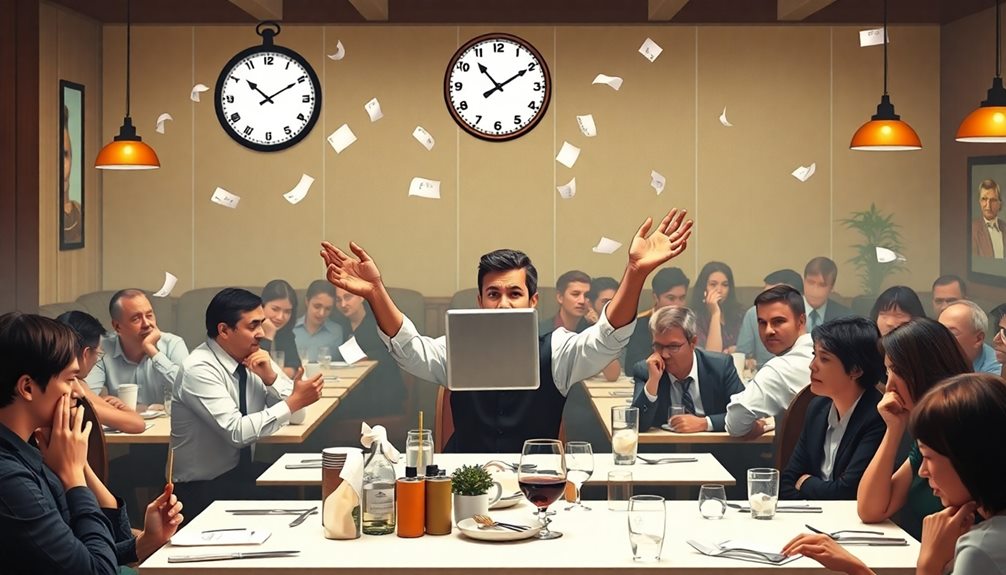
In the fast-paced world of dining, managing reservations comes with its own set of challenges that can impact your restaurant's success. High no-show rates, averaging around 15%, can notably affect your revenue and table turnover, making effective management strategies vital. Mismanagement can lead to overbooked scenarios, disappointing guests and potentially damaging your restaurant's reputation.
Balancing walk-in guests alongside reservations adds another layer of complexity. During peak times, you need clear communication and efficient systems to guarantee customer satisfaction. If reservations aren't handled properly, you risk losing both reserved tables and potential walk-ins, which can hurt your bottom line.
Implementing modern reservation management systems can enhance efficiency and reduce errors, allowing you to track reservation patterns and make better staffing decisions.
However, establishing and communicating clear policies, including your cancellation policy and rules regarding no-shows, is essential. This alignment helps minimize misunderstandings and sets proper expectations for your guests.
Strategies for Effective Management
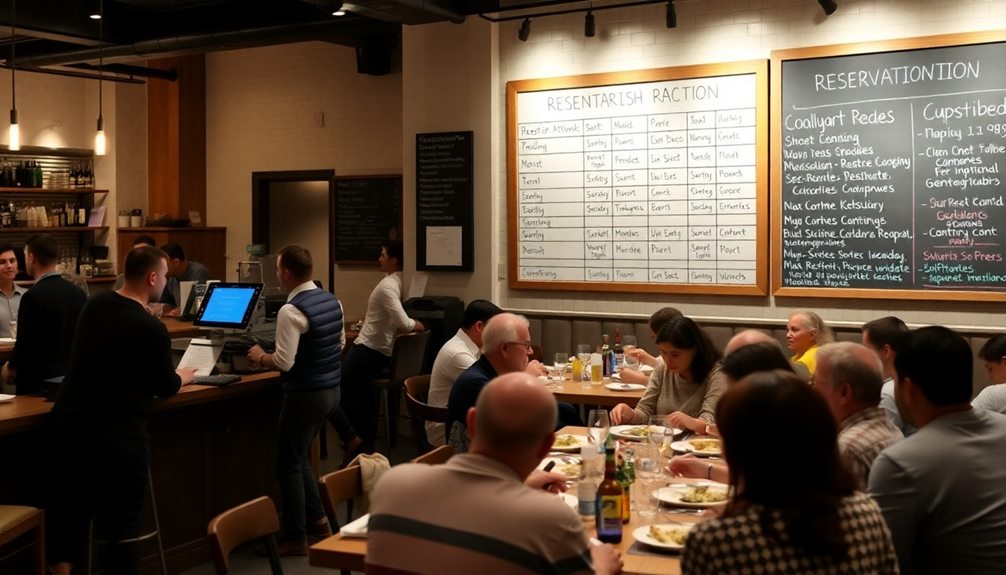
Effective reservation management is crucial for any restaurant's success. To achieve this, you should implement a modern restaurant reservation system that minimizes errors and enhances efficiency. With a high average no-show rate of 15%, establishing a clear no-show policy can protect your revenue.
Utilizing data analytics to analyze booking patterns allows you to anticipate busy times, enabling you to adjust staffing for improved operational effectiveness. Setting clear reservation policies, including cancellation terms and time limits for tables, helps manage expectations and reduces overbooking risks.
You can also boost table turnover by offering promotions or incentives for off-peak dining. This encourages guests to make reservations during slower times, optimizing your revenue potential. You might consider implementing happy hour specials, limited-time discounts, or bundled meal offers to attract diners during these quieter periods. These strategies not only enhance customer satisfaction but also contribute to table turnover rate optimization by ensuring consistent occupancy throughout the day. Additionally, leveraging online booking systems with time-specific promotions can further maximize your seating efficiency and drive sustained profitability.
Furthermore, investing in staff training on reservation protocols and customer service is crucial. Well-trained staff guarantee smooth check-ins and contribute to enhanced guest satisfaction, fostering loyalty and repeat business.
Enhancing Guest Experience
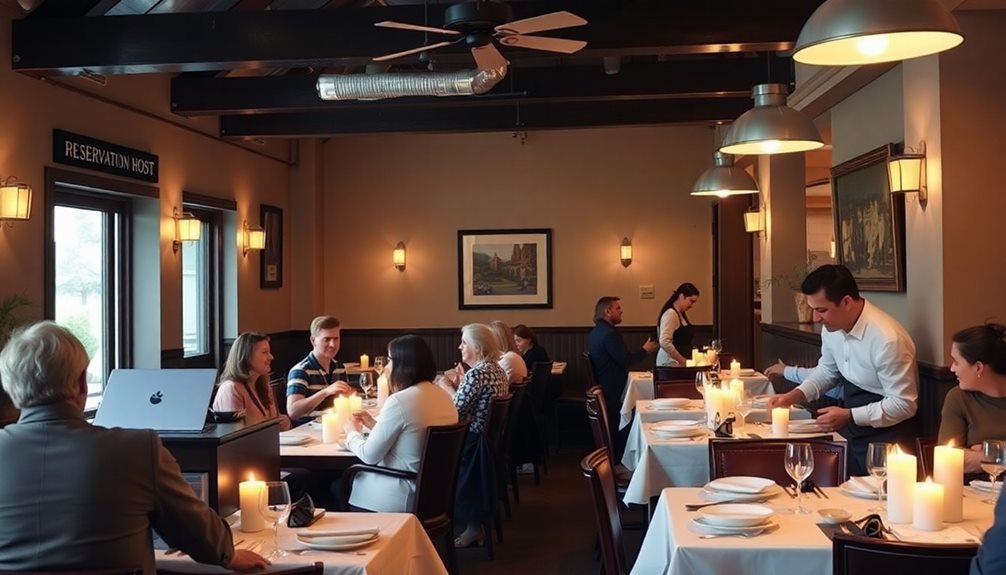
A positive dining experience starts long before guests step foot in your restaurant. By implementing an online reservation system, you can streamline guest bookings, making it easier for diners to secure tables. This reduces wait times during busy dining times and greatly enhances the overall guest experience.
Effective reservation management, including waitlist management, allows guests to add themselves via booking apps, making their visit smoother. Additionally, as remote work becomes a productivity powerhouse, restaurants can benefit from flexible staffing solutions to better accommodate reservation demands.
Clear communication of your reservation policies helps manage expectations. When guests know what to expect, it fosters a positive relationship, ultimately boosting customer loyalty.
You can further enhance their experience by collecting and analyzing feedback on the reservation process. This insight allows you to identify areas for improvement, tailoring experiences to meet your guests' needs.
Automated confirmation emails and reminders play an essential role in reducing no-show rates. Ensuring that guests remember their reservations not only provides them with a seamless experience but also helps you maintain ideal capacity.
Staff Training and Communication
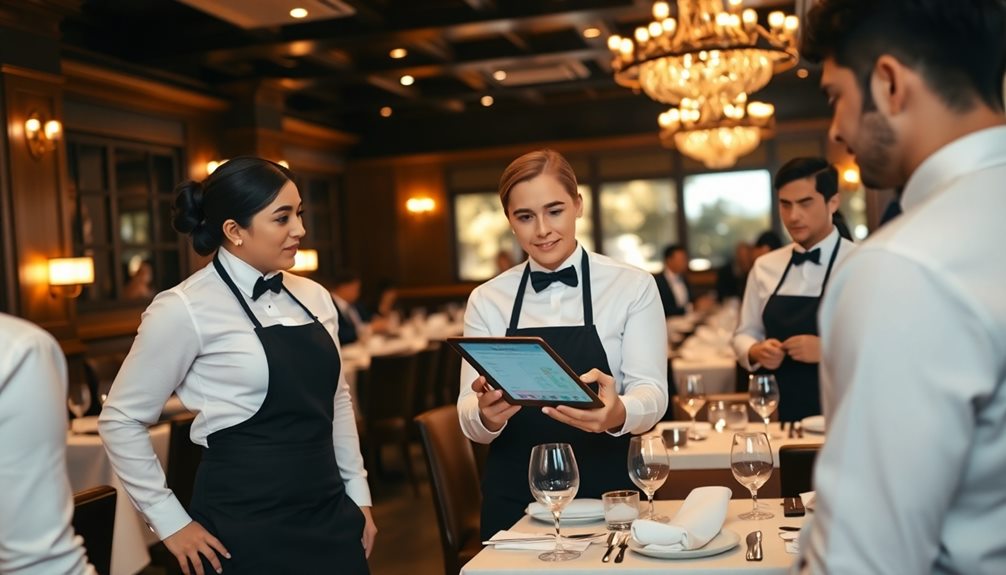
Training your staff to handle reservations smoothly can make a world of difference in guest satisfaction. Start with thorough staff training that incorporates role-playing scenarios, preparing your team for high-pressure situations. This hands-on approach helps them navigate challenges while managing reservations effectively.
Establish clear communication strategies to guarantee your staff can articulate reservation policies and procedures without ambiguity. This clarity sets the right guest expectations and builds trust.
Regular updates on the reservation system's functionalities are essential. When your team understands how to use the technology effectively, it helps minimize errors that could disrupt the guest experience.
Encourage your staff to gather informal employee feedback from guests during service. This practice can reveal areas for improvement in your reservation process.
Additionally, emphasize the importance of timely communication with guests regarding any changes or confirmations. By doing so, you enhance customer satisfaction and demonstrate that you value their time and experience.
Ultimately, a well-trained staff equipped with effective communication strategies can transform your reservation handling, leading to happier guests and a more efficient operation.
Optimizing Reservation Systems
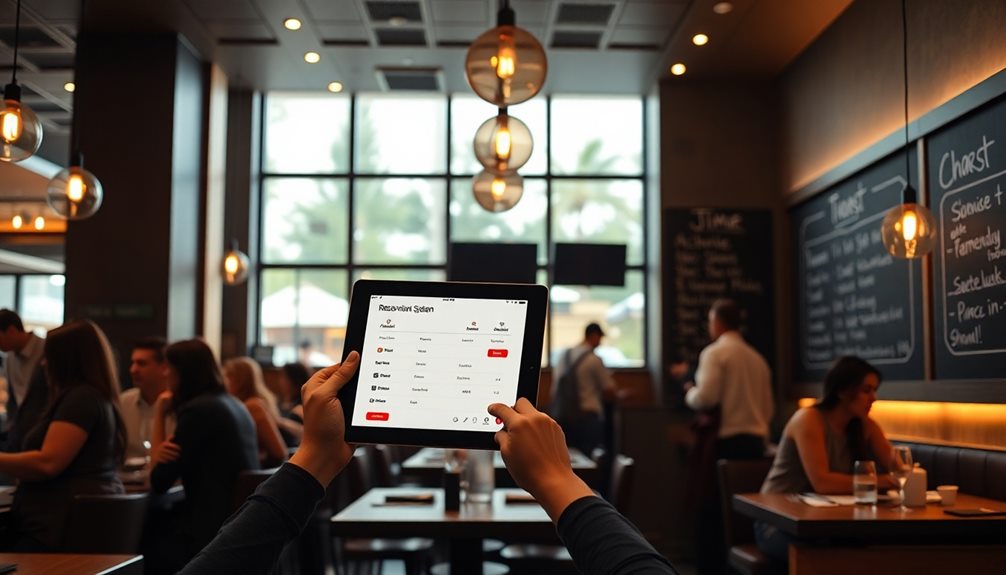
To optimize your reservation system, you need to integrate technology effectively, ensuring smooth guest experiences.
Clear communication of your policies will set the right expectations for diners.
Plus, using data-driven insights can help you make informed decisions that enhance your restaurant's efficiency and profitability.
Technology Integration Benefits
In today's fast-paced dining environment, integrating modern reservation technologies can greatly enhance a restaurant's efficiency and customer satisfaction. By adopting online restaurant reservation systems like OpenTable or Resy, you streamline reservation management, allowing for seamless bookings without the common errors associated with manual processes.
Automated confirmations and reminders can notably reduce no-shows, ensuring that your tables are filled during peak dining times.
Utilizing centralized management tools such as Chowbus POS enables real-time tracking of reservations and waitlists, which dramatically improves operational efficiency. This integration minimizes the risk of double bookings, allowing you to focus on delivering exceptional service to your guests.
Moreover, data analytics from your reservation system will help you identify customer preferences and peak dining times, enabling you to make informed staffing decisions and optimize service delivery.
Offering direct booking options through platforms like Google Maps and your restaurant's website not only enhances customer convenience but also cuts down on the commission costs associated with third-party reservation services.
Embracing these technologies positions your restaurant for success in a competitive market, ultimately leading to happier customers and increased revenue.
Clear Policy Communication
Clear communication of reservation policies is vital for any restaurant aiming to enhance guest satisfaction and operational efficiency. By establishing clear reservation policies regarding booking times, cancellation terms, and no-show consequences, you guarantee that guests understand expectations, reducing confusion and fostering enhanced satisfaction.
Communicating these policies during the reservation process, such as through automated confirmations or reminder emails, can markedly mitigate no-show rates, which average around 15% in the industry.
It's important to apply these reservation policies consistently across all channels—both phone and online bookings—to build trust and reliability with your customers, leading to increased loyalty.
Engaging with guests to explain your reservation policies and any potential changes shows attentiveness and can elevate the overall dining experience.
It's also beneficial to regularly review and update your reservation policies based on customer feedback and operational needs. This adaptability allows you to improve efficiency and align with changing diner preferences.
Data-Driven Decision Making
Effective communication of reservation policies lays a solid foundation for optimizing reservation systems through data-driven decision-making.
By utilizing data analytics, you can analyze booking patterns and customer preferences to make informed adjustments in staffing and inventory based on peak dining times. This not only enhances operational efficiency but also boosts guest satisfaction.
Tracking no-show rates, which average around 15%, gives you insights into potential revenue losses. Implementing strategies like automated reminders can greatly reduce these occurrences.
Additionally, leveraging historical reservation data allows you to forecast demand accurately, optimizing table turnover rates and increasing revenue during rush hours.
Data-driven insights play an essential role in guiding your marketing efforts. You can create targeted promotions during off-peak times to fill empty tables, maximizing your revenue.
Continuous monitoring of reservation logs enables you to identify and resolve potential conflicts, preventing double bookings and ensuring a seamless guest experience.
Incorporating these practices into your reservation management not only streamlines operations but ultimately elevates the overall dining experience for your guests.
Embracing data-driven decision-making is vital for thriving in today's competitive restaurant landscape.
Frequently Asked Questions
How Do Restaurants Keep Track of Reservations?
Restaurants keep track of reservations by using modern management systems. They record essential details like guest names and times, send automated confirmations, and regularly review logs to optimize staffing and enhance customer experiences.
How Do Reservations Work at Restaurants?
Imagine a well-orchestrated dance. Reservations at restaurants work by securing your spot through calls or online. You confirm your time, arrive, and enjoy the rhythm of service tailored just for you.
How Can a Restaurant Strategically Choose the Best Reservation System to Align With Its Business Goals?
To choose the best reservation system, assess your restaurant's needs and goals. Consider online systems for wider reach, integration with POS for efficiency, and direct bookings for control, ultimately enhancing customer experience and loyalty.
How Do You Make Reservations Properly?
When you're in hot water, making a reservation properly is essential. Share your name, contact info, date, time, and guest count. Confirm details the day before to avoid any hiccups. Don't forget the cancellation policy!
Conclusion
In summary, handling restaurant reservations effectively is vital for success. Did you know that restaurants that manage reservations well can see a 20% increase in repeat customers? By leveraging technology and training staff, you can create a seamless experience for your guests. Emphasizing communication and optimizing your systems not only enhances guest satisfaction but also boosts your bottom line. So, take these strategies to heart and watch your restaurant thrive!
